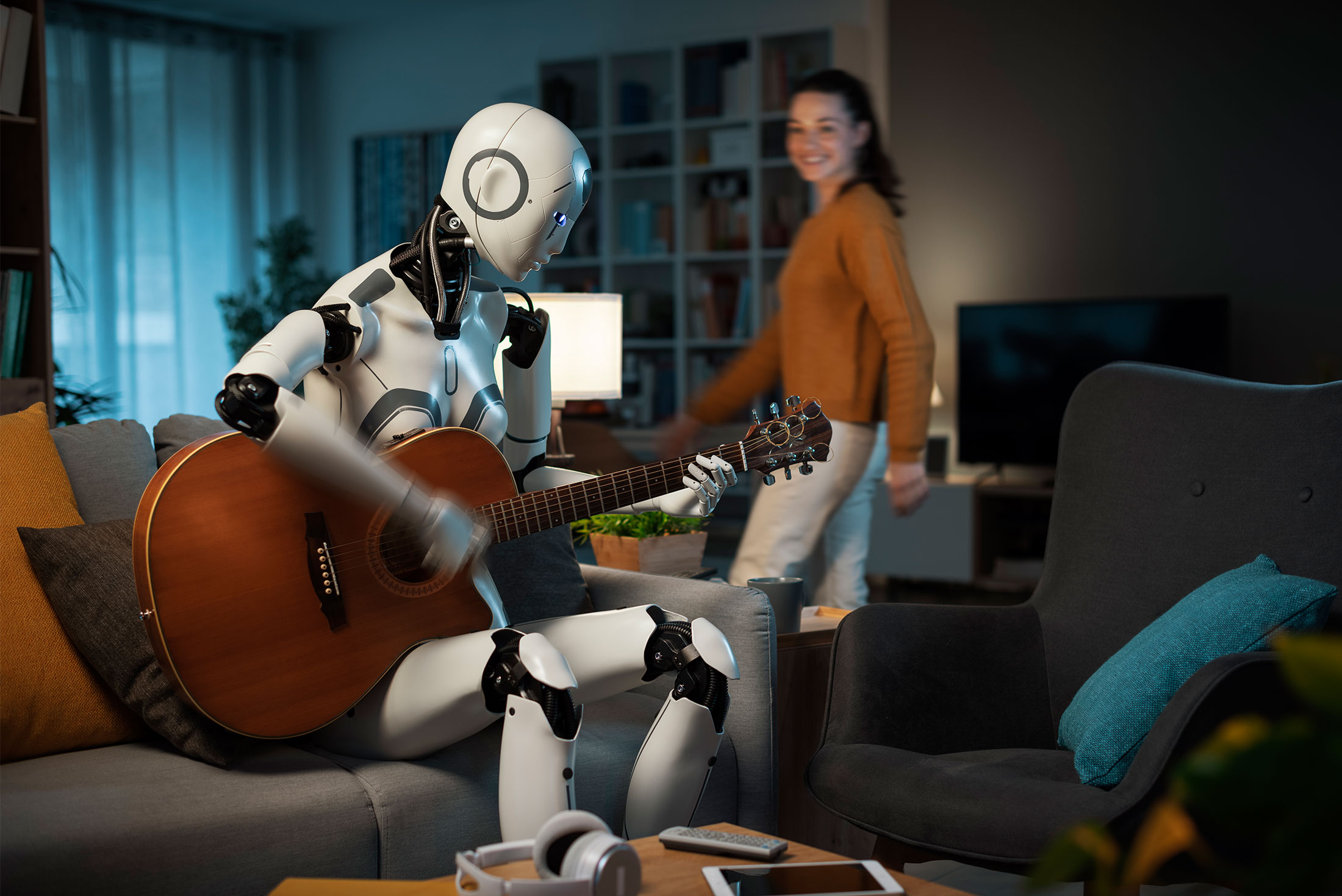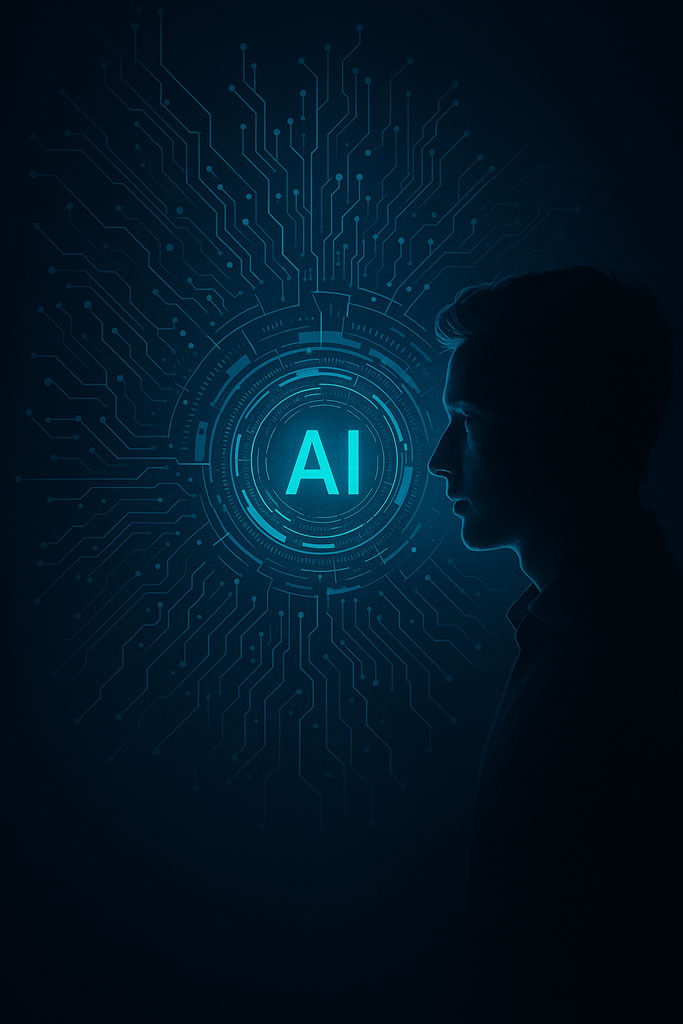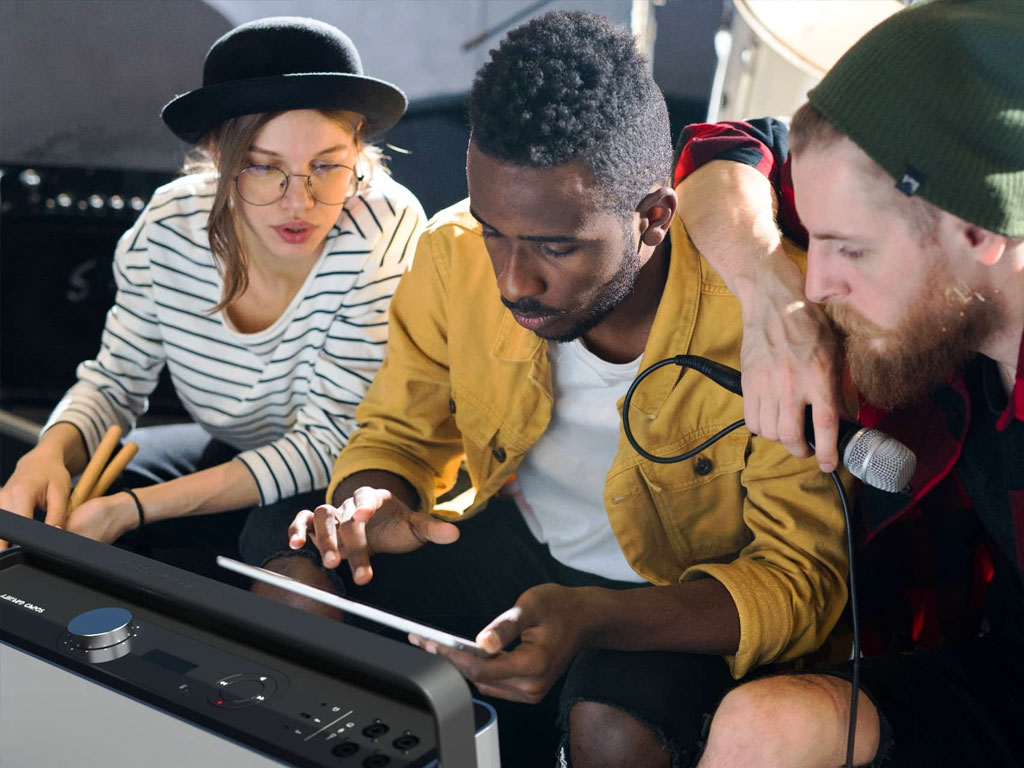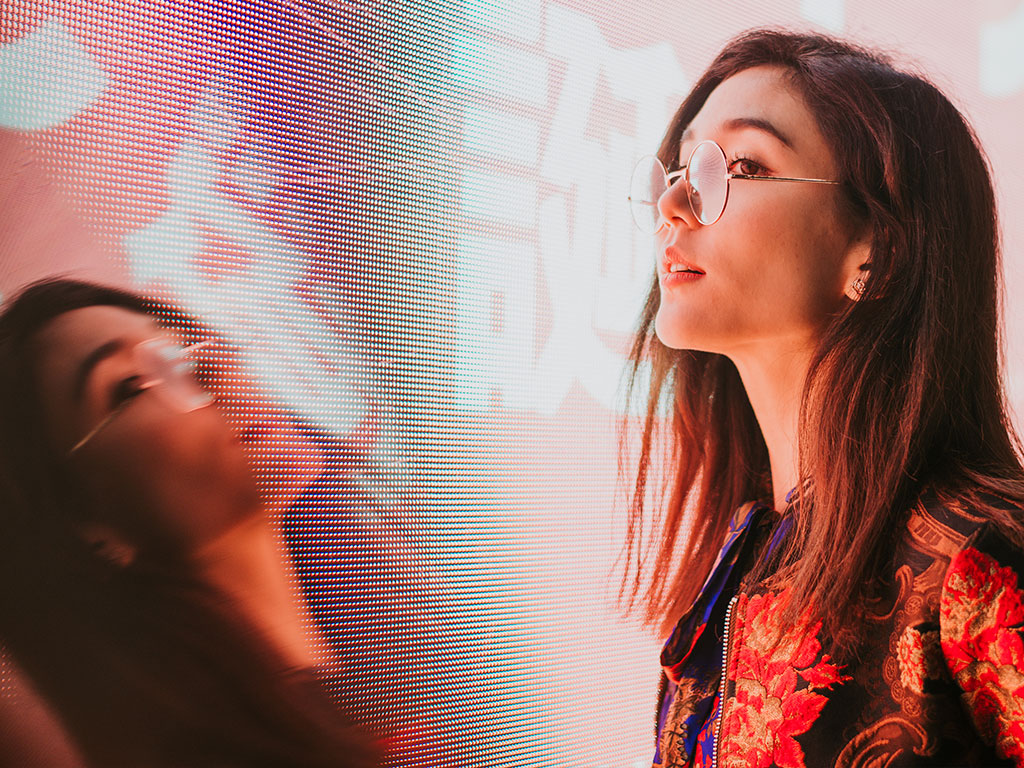1

AI, Robotics & Data
Will Artificial Intelligence make our future more human?
What if AI freed up time for empathy, creativity, and cooperation? Towards growth that is finally in line with humans.
8 min
A paradoxical question
Artificial intelligence fascinates as much as it worries. In the collective imagination, it evokes cold machines, faceless algorithms, jobs replaced by faster and cheaper robots. In short, technology that could dehumanize us.

But what if this vision was incomplete? What if AI was not a force that takes us away from our humanity, but on the contrary a tool capable of revealing it more?
Today, it is already our organizations that transform us into mechanical cogs. The quest for profitability and productivity pushes us to act like machines: fill out forms, follow procedures, check boxes. We spend our days “doing”, without always finding time to “be.”
What if AI could change that? If, by absorbing these repetitive and time-consuming tasks, it finally offered us the space to focus on what makes us unique: listening, creativity, innovation, empathy, the ability to solve situations that are out of the box? A future where technology does not reduce us, but liberates us.
To understand what is at stake, we can take a detour to an unexpected field: fast food. The rise of fast food has changed our relationship with food by making ready-to-eat meals accessible, practical and inexpensive. This model has transformed our habits, but it has not made gastronomy or Michelin-starred chefs disappear. On the contrary, it stimulated a counter-trend: that of the Slow Food, short circuits and culinary experiences where know-how, creativity and relationships are valued. The more machines progress, the more we seek to highlight what cannot be industrialized.
With artificial intelligence, the same mechanism could happen. ChatGPT and its ilk are the intellectual equivalents of fast food: fast, accessible, effective. But they can also arouse new demand for the equivalent of Slow Food of the mind: nourishing knowledge, in-depth reflection, intellectual and human experiences rich in meaning.
This is where our specifically human qualities come into their own. Empathy, consideration, kindness, self-awareness, and genuine care for others are not skills that a machine masters today, and perhaps never with the same depth. Because while AI can simulate emotions or imitate behaviors, it is not living the human experience. And as we interact more with automated systems, our need for authenticity, human validation, and genuine relationships will become even more vital.
Curiosity, the driver of innovation and progress, sets us apart just as much. It is she who pushes us to ask questions, to explore the unknown, to question the obvious. AI can help us, but it can't feed this inner fire. On the contrary, by freeing us from repetitive tasks, it gives us time and energy to revive this discovery engine.
This is already being seen in many sectors. In music, AI can generate arrangements or optimize a mix. But the emotion and the intention remain deeply human: only the artist knows why he chooses this silence or that rhythm. In healthcare, AI automates administrative procedures, but it is the contact of an attentive nurse or a doctor who listens that makes the difference in care. In the company, AI sorts and classifies, but it is the managers who instill vision and cohesion.

In other words: AI is not there to replace humans, but to create the space that allows them to be better embodied. It should not be seen as a force that reduces our jobs, but as an opportunity to give them meaning again, by refocusing individuals on what makes them unique: relationships, creativity, innovation and empathy.
AI as a mirror of our values
Artificial intelligence has no will of its own. It has no desire, no morality, no intention. It is a mirror: it reflects what we project into it, it amplifies what we value.
That is all his ambivalence. If we only entrust our current obsessions to her (productivity, control, profitability), she will only prolong our shortcomings. It can become a machine to monitor, to sort, to exclude. In relationships with the administration or services, this would result in a world of cold algorithms, mechanically applying rules without nuance. In businesses, this could reinforce the logic of numbers rather than meaning. And in the geopolitical sphere, AI could be used to perfect the art of war, accelerating conflicts fuelled by ego, fear or frustration, these very human impulses that our societies have never been able to fully overcome.
But the mirror can also reflect something else. AI could become a tool for personalization, adaptation, and attention to singularities. It can help to better understand the needs of each one, to facilitate exchanges, to free up time for the relationship. It can be put at the service of cooperation rather than competition, of care rather than of domination. In this case, far from dehumanizing us, it would amplify our humanity.

In reality, AI won't choose. It will not be good or bad in essence. It will be what we decide to do with it. A reflection of our shadows if we let our most primitive instincts guide it; a reflection of our ideals if we choose to write our highest values into it.
If AI is a mirror, let's look at it in the face. What is it changing, in concrete terms, in our lives and our jobs?
When AI frees up time to be human
9:17. You call your operator. Usually, it's a waltz of transfers. There, the AI recognizes your file, fixes the billing error in thirty seconds, then refers you to an advisor: your case is out of the box. She listens to you. She's looking. It unlocks. Ten minutes later, it's all settled. What has changed? Not you. Not your problem. The mechanics were absorbed beforehand. What's left is human time.
“AI absorbs the ordinary; the extra-ordinary becomes human again.”

This discreet shift can already be observed in meetings: the systems take notes, synthesize and monitor actions; the teams, freed from the direct secretariat, focus on exchange, debate, and decision. “Doing things mechanically” is being replaced by “doing things together”.
Same logic on the side customer service : in the current model, if your problem does not fit into the boxes, it's a dead end. As soon as the AI processes standard requests (refunds, subscriptions, invoices), advisors become available again for the exception. Their role is changing: fewer scripts, more listening and ingenuity to solve the atypical.
In the Local justice, thousands of small disputes overload the courts. When an AI filters simple files, orients, and writes summaries, it frees up time for what requires nuance: understanding emotions, arbitrating humanely, rebuilding relationships rather than simply sanctioning.
En insurance, declaring a claim often feels like a double penalty: shock is followed by paperwork. Entrusting algorithms with the compensation of current cases allows advisers to focus on serious situations: fires, accidents, bereavements. Now, the main thing is not to go fast, but to be there.
And for the administrative procedures, everyone knows the irony of the message “Your file is incomplete”. As soon as AI processes standard forms from start to finish, agents find their true vocation: welcoming, helping, supporting elderly people, newcomers, all those whose lives do not correspond to the logic of the form.
This movement is crossing other sectors. En health, relieving caregivers of the administrative burden frees up attention for the patient. En upbringing, correcting and adapting exercises can be automated; arouse curiosity, no. In the transports, the optimization of routes gives agents time to inform, to reassure, to help. Everywhere, the same thread: when AI takes on the ordinary, humans find the extra-ordinary.
This does not mean that everything will go by itself. On the contrary, a poorly designed AI can be further confined to rigid processes. But if we think of it as a tool of liberation, it will become that invisible filter that removes noise to give us music.
In a world saturated with forms, protocols, and scripts, we ended up behaving like machines. AI could well be the paradox that forces us to be human again.
What if, henceforth, performance was no longer measured in tasks completed, but in human qualities?
Redefining what really matters
The automation of mechanical tasks and raw intellectual tasks leads to a silent but radical shift: performance criteria are changing. Until yesterday, the effectiveness of an individual was measured by his ability to produce quickly, to execute without fail, to accumulate tangible results. Those who climbed to the top were not always the most creative or the most empathetic, but often those who knew how to impose their power, play power relationships, and take advantage of the flaws in the system.
Tomorrow, these skills will become commonplace, absorbed by machines. Figure tables, profitability calculations, optimized procedures: all this will be processed better and faster by algorithms. The summit will no longer be won through domination or manipulation, but through the ability to inspire, connect and create human value where machines cannot intervene.
This reversal is not a simple adjustment, it is a paradigm shift. The added value will no longer lie in execution, but in relationship and inspiration. In the ability to bring out new ideas, to activate collective intelligence, to transform a group into a community.
This shift could also redefine what it means to be a “leader.” For decades, we have valued those who decide quickly, who impose their will, who perform in a balance of power. But if the execution is entrusted to machines, then human power will no longer be that of order, but that of the link. The leaders of tomorrow may not be the most aggressive, but the most empathetic: those who know how to listen, welcome difference, and put talents into resonance.
“The summit will no longer be won through dominance, but through the ability to connect.”

This is perhaps the greatest contribution of artificial intelligence: by relieving us of the weight of the quantifiable, it forces us to rehabilitate the unquantifiable. Anything that can't be measured in checked boxes or spreadsheet columns: trust, emotion, the ability to transform an encounter into something living.
Tomorrow's human performance will therefore not be a race against machines. It will be the ability to cultivate what machines cannot imitate. Not raw efficiency, but human depth.
A future that is essential, and that can reconcile growth and humanity
AI does not force us to choose between efficiency and empathy: it opens the way for them to converge.
Contrary to popular belief, it is not an alternative: either more productivity or more humanity. Massive automation is going to happen naturally, because repetitive tasks and raw calculations no longer require human intervention. This means that work as we know it will no longer be able to remain at the center of our business models.
In this new context, the real capital will be people: their creativity, their empathy, their ability to connect and inspire. And paradoxically, this evolution will not hinder growth. On the contrary: AI will make it possible to reach an unprecedented level of efficiency, while freeing individuals for what makes sense.
By freeing humans from the burden of mechanical tasks as well as raw intellectual tasks, AI is not only transforming the way we work: it is redefining what really matters. Because if execution can be trusted to machines, then the real value no longer lies in what we produce, but in what we transmit: empathy, creativity, the ability to inspire and connect.
Perhaps this is the most fruitful paradox of artificial intelligence: by surpassing us in efficiency, it forces us to become fully human again. With it, we will no longer have to choose between make and being : the two will go hand in hand, in a society where economic performance and human development finally align.



